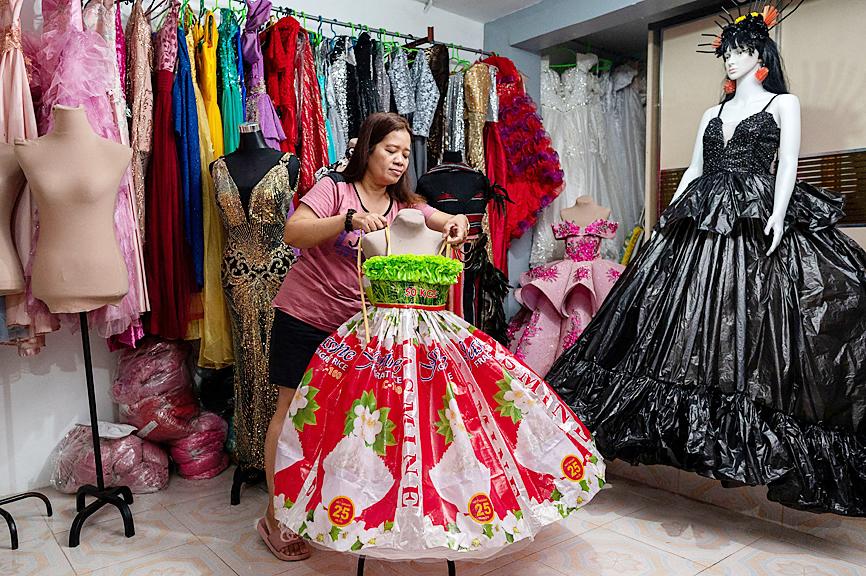Lenora Buenviaje has been making dresses out of waste materials for the past seven years, and says wearing clothes made from items such as recycled newspapers, plastic wrapping and rice sacks can be both economical and fashionable.
Using a foot-operated sewing machine, the 51-year-old Filipina seamstress stitches, and weaves plastics and other materials into inventive and fashionable frocks and gowns, sometimes completed by headdresses.
“The bubble wraps from delivery packages are nice looking and make for a good design, especially the black and white wraps,” she said at her shop in Cainta, Rizal Province.

Photo: Reuters
White wraps were good for making fairy or wedding gowns, she said.
The dresses sell for US$30 to US$50 and are used for everything from debuts — a coming-of-age party for a woman’s 18th birthday — to weddings.
In Asia, there is plenty of waste material for Buenviaje to work with: About 80 percent of global ocean plastic is estimated to come from Asian rivers, and the Philippines alone contributes one-third of that, according to a report this year by the University of Oxford’s online publication Our World in Data.
“It’s important to recycle or utilize used materials so we can help our earth,” said Buenviaje’s client Lalaine Alcalde.
The recycled material used for each dress depends on what her clients are looking for, said Buenviaje, who lives in Cainta, about 15km east of Manila.
Her gowns are sometimes used in beauty contests and pageants, she said.
“I get delighted whenever they win, the designs are simple, but they still win,” she said.
Buenviaje hopes in-person fashion shows and competitions that were halted during the COVID-19 pandemic would soon resume.
She also aims to organize fashion events to showcase and inspire others to create clothing out of recycled materials.

PARLIAMENT CHAOS: Police forcibly removed Brazilian Deputy Glauber Braga after he called the legislation part of a ‘coup offensive’ and occupied the speaker’s chair Brazil’s lower house of Congress early yesterday approved a bill that could slash former Brazilian president Jair Bolsonaro’s prison sentence for plotting a coup, after efforts by a lawmaker to disrupt the proceedings sparked chaos in parliament. Bolsonaro has been serving a 27-year term since last month after his conviction for a scheme to stop Brazilian President Luiz Inacio Lula da Silva from taking office after the 2022 election. Lawmakers had been discussing a bill that would significantly reduce sentences for several crimes, including attempting a coup d’etat — opening up the prospect that Bolsonaro, 70, could have his sentence cut to

A powerful magnitude 7.6 earthquake shook Japan’s northeast region late on Monday, prompting tsunami warnings and orders for residents to evacuate. A tsunami as high as three metres (10 feet) could hit Japan’s northeastern coast after an earthquake with an estimated magnitude of 7.6 occurred offshore at 11:15 p.m. (1415 GMT), the Japan Meteorological Agency (JMA) said. Tsunami warnings were issued for the prefectures of Hokkaido, Aomori and Iwate, and a tsunami of 40cm had been observed at Aomori’s Mutsu Ogawara and Hokkaido’s Urakawa ports before midnight, JMA said. The epicentre of the quake was 80 km (50 miles) off the coast of

China yesterday held a low-key memorial ceremony for the 1937 Nanjing Massacre, with Chinese President Xi Jinping (習近平) not attending, despite a diplomatic crisis between Beijing and Tokyo over Taiwan. Beijing has raged at Tokyo since Japanese Prime Minister Sanae Takaichi last month said that a hypothetical Chinese attack on Taiwan could trigger a military response from Japan. China and Japan have long sparred over their painful history. China consistently reminds its people of the 1937 Nanjing Massacre, in which it says Japanese troops killed 300,000 people in what was then its capital. A post-World War II Allied tribunal put the death toll

A passerby could hear the cacophony from miles away in the Argentine capital, the unmistakable sound of 2,397 dogs barking — and breaking the unofficial world record for the largest-ever gathering of golden retrievers. Excitement pulsed through Bosques de Palermo, a sprawling park in Buenos Aires, as golden retriever-owners from all over Argentina transformed the park’s grassy expanse into a sea of bright yellow fur. Dog owners of all ages, their clothes covered in dog hair and stained with slobber, plopped down on picnic blankets with their beloved goldens to take in the surreal sight of so many other, exceptionally similar-looking ones.